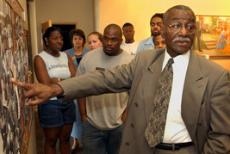Press coverage of Rev. Fred Shuttlesworth’s passing has understandably focused on his work for civil rights in the 1950s and 1960s, but we don’t hear much about his service as a pastor proclaiming the gospel of Christ to his congregants — and about the Christian love that motivated his non-violence and non-retaliation in the face of persecution. Here’s a brief account of the man in that broader context.
********************
 On Christmas night 1956, Fred Shuttlesworth—pastor of the Bethel Baptist Church in Birmingham, Alabama—reclined on his bed, talking to a church deacon, Charlie Robinson. With their families downstairs enjoying their new Christmas gifts, pastor and deacon had retired to the bedroom to converse. About 9:40, the minister’s daughter Ricky heard a sound outside, like a newspaper being thrown on the front porch. Seconds later, a thunderous explosion ripped through the parsonage, collapsing the roof on the front part of the house and blowing the support pillars fifteen feet into the yard. Groping about in the dust, Shuttlesworth found his family—all safe and unhurt—and stumbled into the front yard.
On Christmas night 1956, Fred Shuttlesworth—pastor of the Bethel Baptist Church in Birmingham, Alabama—reclined on his bed, talking to a church deacon, Charlie Robinson. With their families downstairs enjoying their new Christmas gifts, pastor and deacon had retired to the bedroom to converse. About 9:40, the minister’s daughter Ricky heard a sound outside, like a newspaper being thrown on the front porch. Seconds later, a thunderous explosion ripped through the parsonage, collapsing the roof on the front part of the house and blowing the support pillars fifteen feet into the yard. Groping about in the dust, Shuttlesworth found his family—all safe and unhurt—and stumbled into the front yard.
A white police officer, surveying the destruction, whispered to him, “I didn’t think they would go this far. I know these people. Reverend, if I were you, I’d get out of town as fast as I could.” Stopping him short, the pastor replied, “Officer, you are not me. You see God saving me through all this. So you go back and tell your Klan brethren that if God could keep me through all this, then I’m here for the duration.”1 Speaking to reporters a few minutes later, he testified: “I know it was the hand of God. I know I was preserved for a purpose: to preach the gospel of Jesus Christ and to implement that gospel insofar as possible as it relates to human dignity and human rights.”2
Time was ripe for change. In 1948, President Truman had signed an executive order ending racial divisions in the armed forces. In 1954, the Supreme Court’s decision in Brown v. Board of Education repudiated the “separate but equal” approach to racial discrimination in the public schools. Now in 1956, the Montgomery bus boycott had just ended in success, and Shuttlesworth announced that Birmingham would follow suit. According to plan, thousands of black citizens would board the buses on December 26 and sit in the “white” sections until city officials repealed the racial segregation laws.
Unlike Martin Luther King, Jr., Fred Shuttlesworth was not primarily a civil rights leader. He was a pastor. Throughout the movement, he maintained strong and vital ties to his congregation, preaching to them on most Sundays despite a nation-wide speaking schedule. His sermons were fervently evangelical, expounding the truths of the gospel and calling sinful people to repent and believe in Jesus Christ. He called on church members to consecrate their lives to Christ’s service—and to act in furtherance of God’s kingdom.
Following his own preaching, Shuttlesworth served in the street as well as in the pulpit. He was present when Autherine Lucy made her bid at desegregating the University of Alabama in 1956; he rescued several beaten “Freedom Riders” in 1961; together with King, he led the Birmingham marches of 1963 which finally issued in the Civil Rights Act of 1964.3
Besides having his home bombed, Shuttlesworth suffered from police abuse, high-pressure water hoses, and hundreds of threats against his own life. Through it all, he maintained his Christian witness, calling on blacks not to respond with violence, but to love their enemies. In 1957, Shuttlesworth was brutally beaten by a white mob as he tried to enroll his two daughters at Phillips High School. As he left the hospital later that day, someone asked what he was fighting for in Birmingham. He replied, “For the day when the man who beat me and my family with chains at Phillips High School can sit down with us as a friend.”4
Though too uneducated and too unpolished in the eyes of many to be a prominent and effective leader, Shuttlesworth knew his power lay in fidelity to the gospel and to the whole counsel of Scripture. Acting on that understanding as best he could, he helped to bring about one of the greatest social reformations in the history of America. His example is a wonderful encouragement to all believers, as they focus and act upon the teachings of Christ, whatever the cost.
| 1 | Michael Manis, A Fire You Can’t Put Out (Tuscaloosa: University of Alabama Press, 1999), 110. (Manis also offers a summary account of Shuttleworth’s service under “Birmingham’s Reverend Fred Shuttlesworth: Unsung Hero of the Civil Rights Movement,” Baptist History and Heritage, Summer-Fall 2000 or at http://www.findarticles.com/cf_dls/m0NXG/3_35/94160959/p1/article.jhtml?term=.) |
| 2 | Ibid., 109. |
| 3 | John Salmond, My Mind Set on Freedom (Chicago: Ivan R. Dee, 1997), 32, 90. |
| 4 | Manis, 154. |